As people take to the streets of Iran and Kurdistan shouting “Women, Life, Freedom!”, Iranian music artists are raising their voices, too. With a two-day takeover of Radio Alhara by Iranian female and non-binary artists, artists inside the country speak to us about this moment and its connection to a long history of resistance.
We’re indebted to some of these very artists for their musical inspiration. They’ve been leaders in where electronic music and performance can go, as with all genres; they’ve been resonant spirits in sound. Now, I think we owe it to them to listen to their full experience and try to understand and share their fight for freedom.
Palestinian/international Radio Alhara hosts a takeover of its Sonic Liberation Front today and tomorrow, Thursday – Friday September 29-30, entirely featuring female and non-binary artists from Iran and the Iranian diaspora. This itself is significant, as the Iranian government places numerous restrictions on music specifically for women. (See the interviews below.)
The first thing to do, then, is to tune in this radio stream and spread it to as many folks as you can (for the Americas, you’ll start early in the morning but still go through the full day). Music here covers the full gamut of sonic idioms – experimental, electronic, jazz, classical, electro-pop, and eclectic.
Here’s what organizers say about the message and participants:
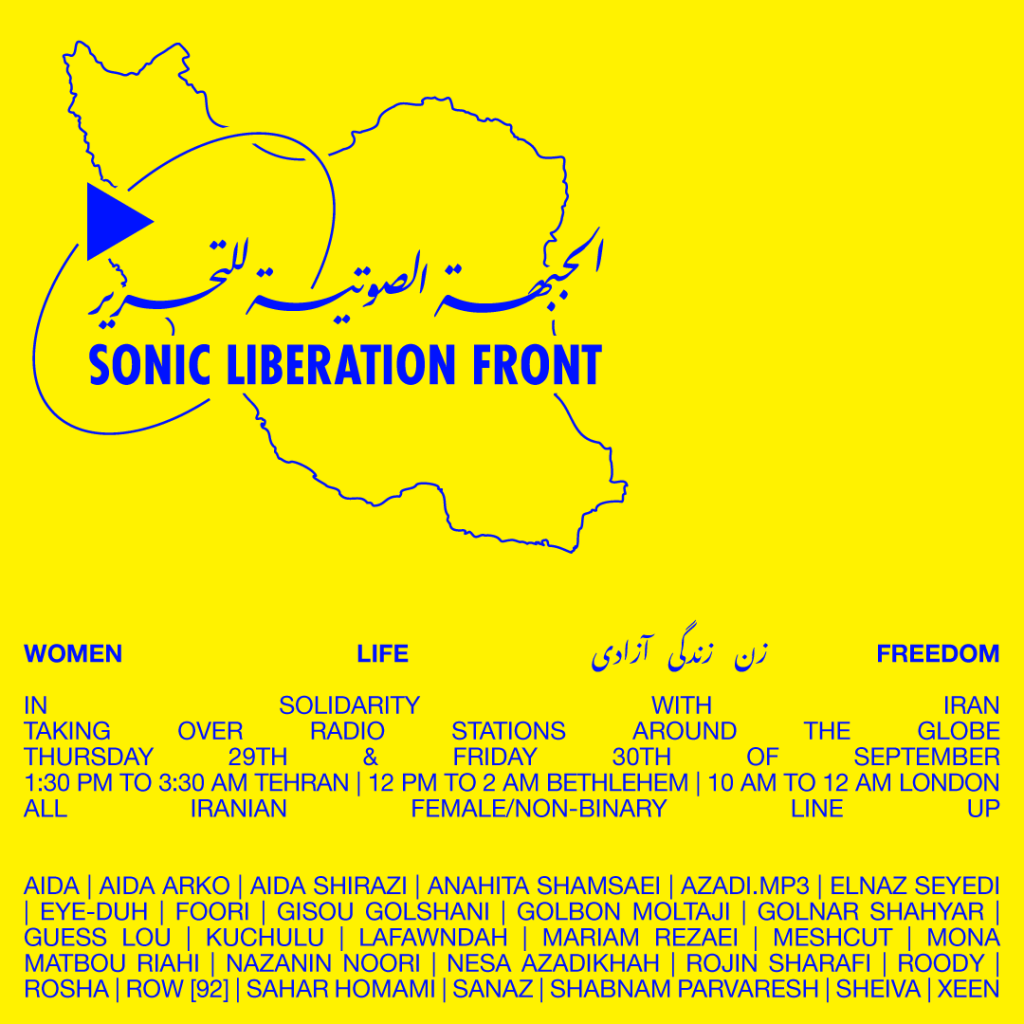
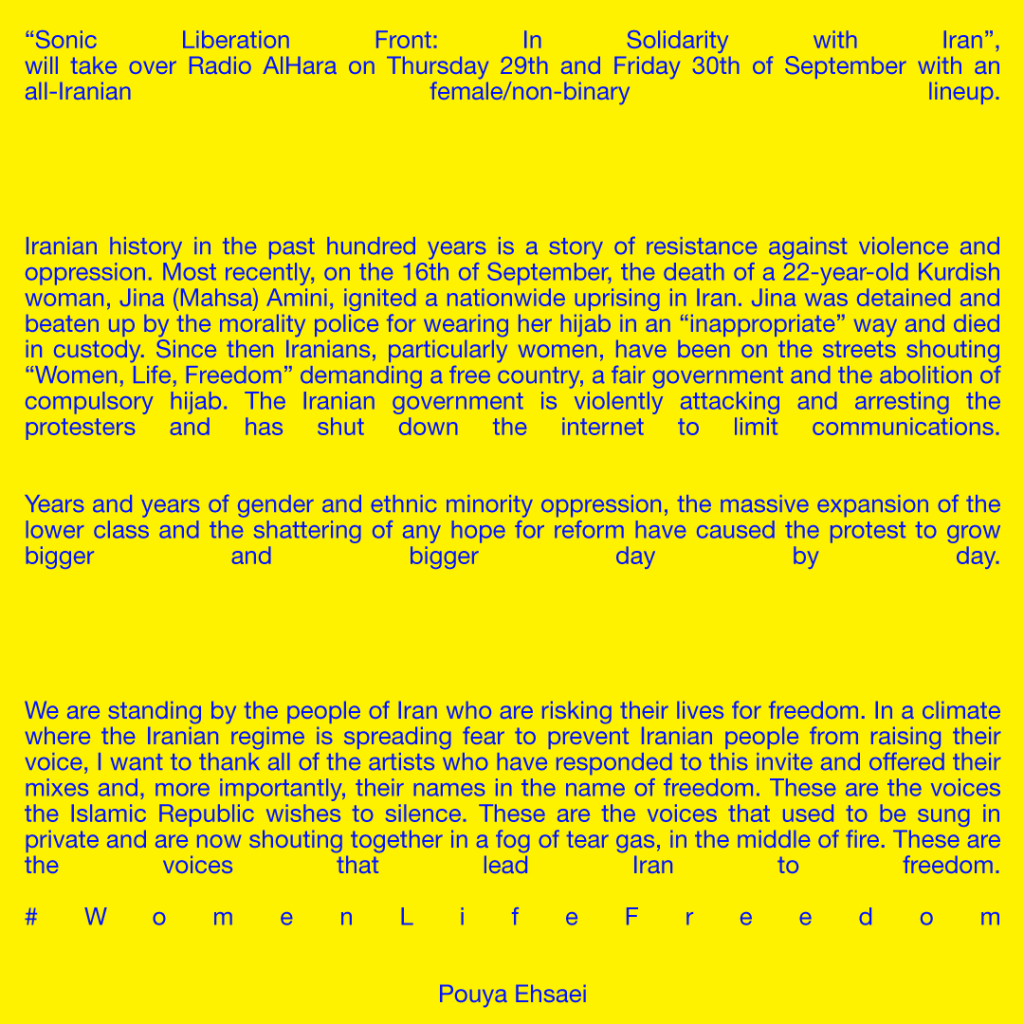
In Solidarity with Iran and Kurdistan
Taking Over Radio Stations Around the Globe
Thursday 29th & Friday 30th of September
1:30pm to 3:30am (Tehran) | 12pm to 2am (Bethlehem) | 10am to 12am (London)
All Iranian Female/Non-binary Line Up
Aida | Aida Arko | Aida Shirazi | Anahita Shamsaei | AZADI.mp3 | Elnaz Seyedi | Eye-Duh | Foori | Gisou Golshani | Golbon Moltaji | Golnar Shahyar | Guess Lou | KUCHULU | LAFAWNDAH | Mariam Rezaei | Meshcut | Mona Matbou Riahi | Nazanin Noori | Nesa Azadikhah | Rojin Sharafi | Roody | Rosha | ROW [92] | Sahar Homami | Sanaz | Shabnam Parvaresh | SHEIVA | Xeen
“Sonic Liberation Front: In Solidarity with Iran”, will take over Radio AlHara on Thursday 29th and Friday 30th of September with an all-Iranian female/non-binary lineup.
Iranian and Kurdish history in the past hundred years is a story of resistance against violence and oppression. Most recently, on 16 September, the death of a 22-year-old Kurdish woman, Mahsa (Jina) Amini, ignited a nationwide uprising in Iran. Mahsa/Jina Amini was detained and beaten up by the morality police for wearing her hijab in an “inappropriate” way and died in custody. Since then Kurds and Iranians, particularly women, have been on the streets shouting “Women, Life, Freedom” demanding a free country, a fair government and the abolition of compulsory hijab. The Iranian government is violently attacking and arresting the protesters and has shut down the internet to limit communications.
Years and years of gender and ethnic minority oppression, the massive expansion of the lower class and the shattering of any hope for reform have caused the protest to grow bigger and bigger day by day.
We are standing by the people of Iran and Kurdistan who are risking their lives for freedom. In a climate where the Iranian regime is spreading fear to prevent Iranian and Kurdish people from raising their voice, we want to thank all of the artists who have responded to this invite and offered their mixes and, more importantly, their names in the name of freedom. These are the voices the Islamic Republic wishes to silence. These are the voices that used to be sung in private and are now shouting together in a fog of tear gas, in the middle of fire. These are the voices that lead Iran to freedom. #womenlifefreedom
Listen live:
SLF takeover organizer/curator and artist Pouya Ehsaei sends this statement and speaks to us from the UK.
Artists ROODY and GUESS LOU speak to us from inside Iran – hugely grateful to them for doing so, especially as that impacts their safety and has to occur through the Internet shutdowns they describe. (Text communication remains important.)
Rojin Sharafi, whose work you may have seen here before, takes time out of their European tour to answer questions in collaboration with friend and researcher Niloufar Nematollahi.
Images here are from the current protests (anonymous photographers).
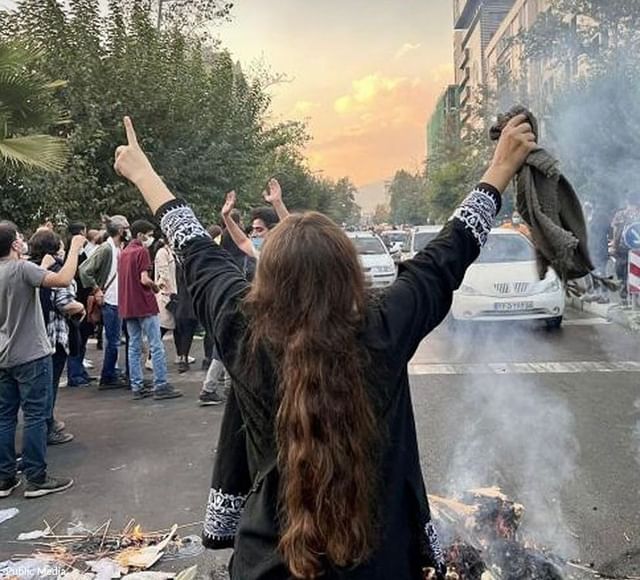
Music can help you connect with your society by engaging with what you want to change.
ROODY
CDM: Can you tell us a bit about the artists involved and the impetus for this broadcast?
Pouya Ehsaei: As part of the Iranian regime’s strategy to shut down the movement, they are putting lots of their resources into identifying the activists and the leaders of the movement in and out of Iran. They are filming and photographing the protesters on the streets of Iran and after identifying the protesters, arrest them in their houses or in somewhere in their neighborhood. Two days ago, they arrested one of my friends Sarah, a sculptor and a chef, at her house after searching and confiscating her belonging. Outside Iran, they do a similar thing: they film the protestors in order to identify them and arrest them when they are returning to Iran. In my opinion, this is mostly trickery; they want us to fear being present, and they want us to prevent ourselves to take action against them. This is a strategy they’ve been using for many years. It had worked for a while, but the new generation does not fear since they have nothing to lose.
In this situation, the act of putting forward one’s name attached to a campaign that has big exposure like “SLF in Solidarity with Iran” is a radical action itself, and I appreciate the courage and dedication of all the artists who participated in this action.
When we see Internet shutdown – what does that mean in practical terms? I see lots of circulating calls for Tor servers, stuff like this, but presumably, that doesn’t help if Internet infrastructure is slowed down or ceases to work at all, right? How are you managing communication?
Roody: It practically means they are about to shoot people and use violence. The purpose of these shutdowns is not just to hinder mobilization or to block the sharing of videos showing police brutality.
It may not seem like an act of violence, but when nobody is able to document brutality, it is able to flourish. Communication by phone is impossible these days; most people meet in the streets. We couldn’t even call each other sometimes.
Guess Lou: Well, Internet shutdown practically means this phrase appears under your internet connection: “no Internet access.” And no means no. No communication. And this happens every time people are in the streets to protest. Other times of year, big social media and many websites are filtered. It means you need a VPN for communication. You learn to manage these things by living in this country. It takes your time and your money to be online with the rest of the world. It means you are always slower than your friends in other countries.
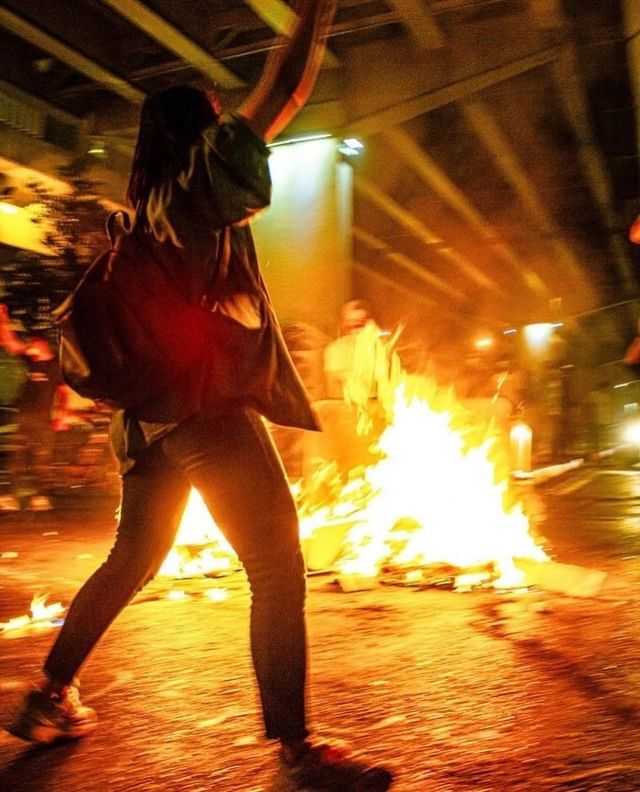
I know this is really difficult in some ways for diaspora Iranians or anyone outside the country; how are you staying connected? What can we do to support you specifically in terms of working with you in the countries we share?
Rojin Sharafi / Niloufar Nematollahi: I think what independent media can do in these times is to reflect marginalized Iranian voices and open their platforms for discussions about the multi-layered oppression and struggles that remain partly unrecognized in the Global North.
Being confronted with oppressive narratives in media is very tiring. Media narratives pushing women* into inferior positions serve the same political ends as the policies that dictate Iranian women* what to wear and what not to wear. We are protesting against any kind of politics that demands us what to say or what to wear.
You raise questions of both gender and minority oppression and anti-reform, and classist policies – these are issues that go beyond just musical ones. But what does this mean to music or musicians, and what can music do that’s meaningful?
Roody: Music can help you connect with your society by engaging with what you want to change.
All protest songs act as tools to ”educate” the listener … to promote an ideology, encourage activism, and galvanize that movement by drawing people together and inspiring them to take action or reflect.
This movement started as a result of decades of oppression against women in Iran. The ongoing protests mark a watershed moment for Iran and possibly the Middle East as a whole — a women’s revolution that spans class and ethnic divides and hopes to tear down patriarchy manifested in its most violent form.
Rojin Sharafi / Niloufar Nematollahi: I would like to highlight the importance of actions like this radio takeover. This radio show is not a means to “prove” our power to western media entities. Instead, we use sound as a means to bring together Iranian female and non-binary artists from inside as well outside Iran. It’s a a collection of sounds, either gathered or created carefully by people who have been directly affected by the structural and direct violence of the Iranian state. People who have chosen to document their lives, thoughts, feelings and politics through sound.
This radio takeover overcomes the distance between different Iranians fighting for the same cause in and outside Iran; it overcomes the distances imposed on us due to politics. It is a means to create a record, an archive of the music and sounds that are shaping a revolution — an alternative sonic approach that attempts to engage with the difficult task of pinpointing protest, rage, and political change as it unfolds in front of our eyes.
This radio takeover overcomes the distance between different Iranians fighting for the same cause in and outside Iran; it overcomes the distances imposed on us due to politics. It is a means to create a record, an archive of the music and sounds that are shaping a revolution — an alternative sonic approach that attempts to engage with the difficult task of pinpointing protest, rage, and political change as it unfolds in front of our eyes.
Rojin Sharafi
The current uprising is unparalleled on multiple fronts. It has galvanized all classes and social groups, with protests erupting in most cities across Iran — although this has come at the bitter price of dozens killed and thousands arrested.
Guess Lou: It doesn’t matter what your job is in a repressive regime; if you are in the minority “they” don’t let you into the game. The only meaningful thing to do in this situation is to resist. The regime of the Islamic Republic of Iran hates music and instruments. And yet I see that we have wonderful musicians — both in the country and outside. It means at first we are facing suppression of music and then suppressing minorities. As long as you make music or sing or even listen to music, you’re resisting and it is a meaningful action.
How can you best describe what this movement is about – what it means to chant “Women, Life, Freedom” – especially in terms of how it might have been misunderstood if people don’t look past the headlines?
Guess Lou: In a repressive system, any new and different idea will be eliminated in the name of being foreign (and foreign means enemy in this system). This elimination will take the meaning of freedom from society. And the flow of life will turn into discouragement. “Woman” is the symbol of life because she can give birth. Iranian people are thirsty for freedom that has been taken from them for years. And they understand very well that the freedom of all depends on the freedom of women.
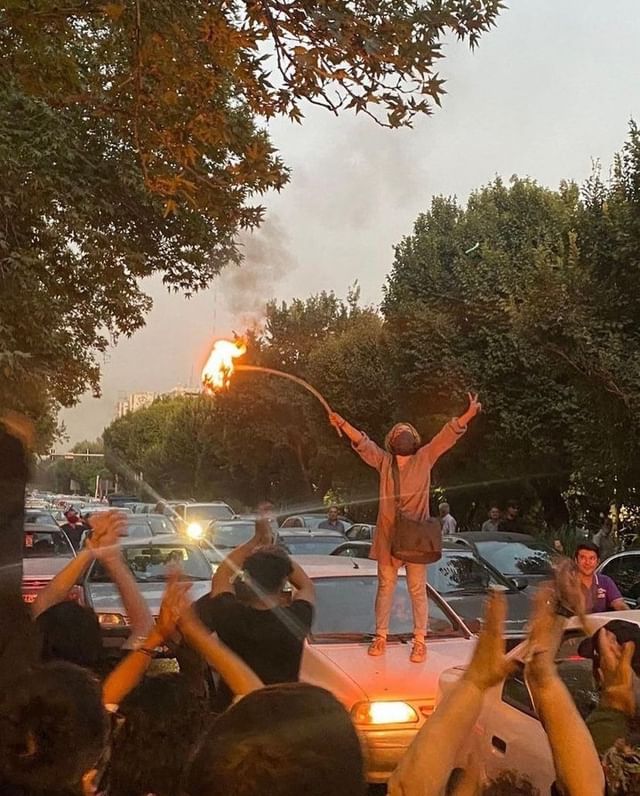
For those now in the country, what’s the sense of where things are at? There must be some fears of greater repression of this movement; how do you respond to that? What can you tell us about the current situation on the ground, especially as we may not get a clear picture from only news and social media?
Guess Lou: I cannot describe to you all that is happening, but I need to mention something to you. This is not a new movement that suddenly happened a week ago. We have been fighting for years. Greater repression? In the fall of 2020, they killed 1,500 people in less than a week. They are pointing guns at people in the streets that should be used in a war against a foreign enemy who wants to attack the country’s territory. It is for this reason that the courage of Iranian women is talked about today. Men and women take to the streets to protest knowing that they may not return home. You may have heard our voice recently, so I feel the need to reiterate that this is not a newly formed movement. This is the voice of the Iranian people after years of struggle for freedom.
Roody: People in Iran have seen the worst; they don’t want to stop. I don’t want to stop. Every single one of us hopes for freedom. Ha – I personally am not afraid of greater repression. I have seen “Aban.” xxxx
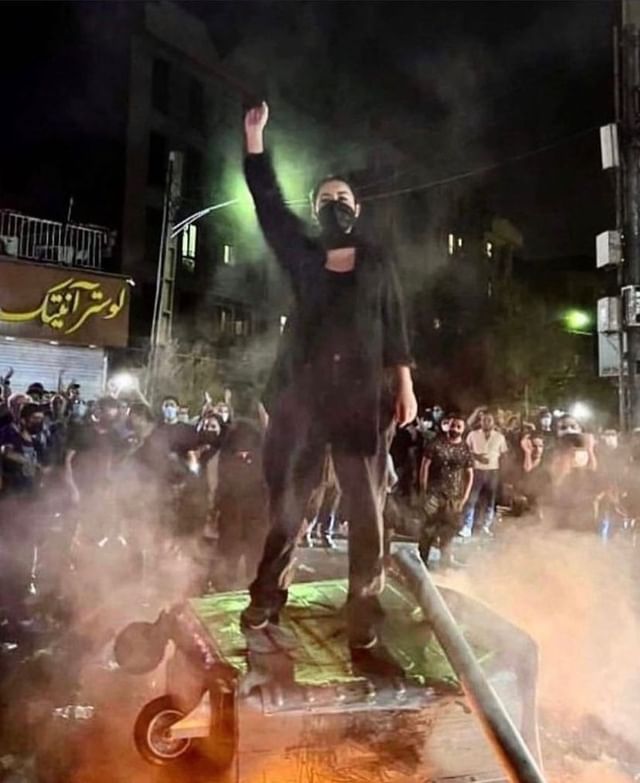
Especially in the west, there can be uncertainty about how to become involved or to be an ally. What would you ask musical audiences to do – what sort of action can make a difference?
Roody: The only thing we need from them is to be our voice, spread the news, and represent our voice through your country for your people and government.
Guess Lou: Do not be indifferent to what is happening in Iran, Afghanistan, Syria, Iraq, Turkey, Lebanon, Palestine. Our freedom is tied together. I don’t know what the best course of action is, but I know that those who care about freedom will find it well.
Do not be indifferent to what is happening in Iran, Afghanistan, Syria, Iraq, Turkey, Lebanon, Palestine. Our freedom is tied together.
GUESS LOU
What is the connection to the Kurdish community; what’s your sense of their role in expressing this protest, following Mahsa Amini’s death?
Roody: Mahsa Amini was Kurdish and Kurdish people are about 10% of the country’s population — about 10 million people, living primarily in Iran’s northwest. And they have been oppressed by the Iranian nation-state, both under the monarchy and under the Islamic Republic today. Their language, which is distinct, is restricted. Their culture is restricted. They make up almost half of the political prisoners in the country despite being a small portion of the population. Their dissidents aren’t safe even when they’ve fled. Iran has assassinated Kurdish leaders. And Kurdish provinces are among the poorest in the country due to economic exploitation by the state, which drives many who live there into deadly jobs like unregulated cross-border trade.
Notably, this is not the first time that Iranian women have courageously resisted these discriminatory practices.
Guess Lou: Let me tell you one thing clearly. It doesn’t matter what ethnicity it is. If this happened to any girl of any ethnicity, the result would be the same as what you saw. Because we received this message that we are all Mahsa.
GUESS.LOU works across media – not only music but also words and publishing, as seen here:
Listen live now: